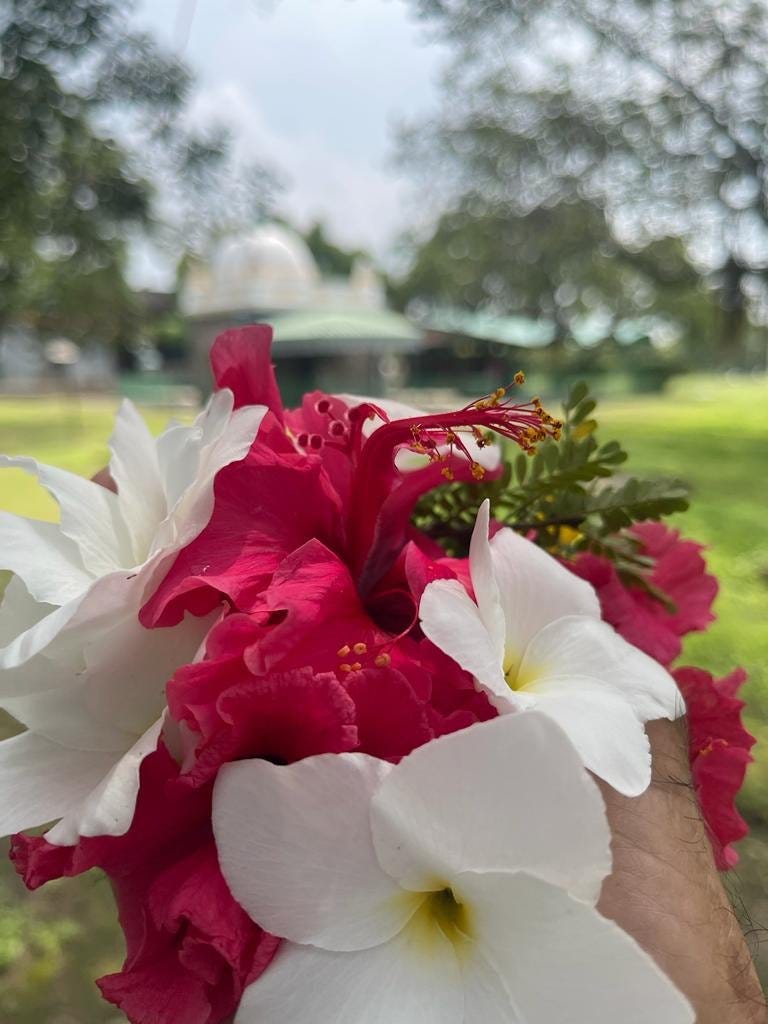Taking Flowers to Samadhi
Samadhi is the small, airy shrine of Meher Baba,* where a mural of muted colors covers the walls. A garden of heart-shaped garlands rises in a colorful pile on the altar cloths with Baba’s simple words in gold leaf, on white marble: “I have come not to teach but to awaken.” Only birdcalls, the movement of pilgrims coming in to bow down, or occasional, muted voices from the covered porch interrupt the silence.
My first pilgrimage to Meherabad* was twenty-five years ago on November 11, 1997. The scheduled arrival at 11:00 p.m. had been delayed, and it was after midnight when we began gently banking over Chhatrapati Shivaji Maharaj International Airport. From my window seat, with my forehead pressed to the glass, I looked out at my first view of Mumbai, India—a vast orchard of lights—and was mesmerized.
In the morning, after the pilgrims left for breakfast, Samadhi was mostly empty. I would sit alone in the place I liked best, in front, on the right. With my left shoulder curved toward the wall, I turned my head toward the painting of Baba as a young man in a long, loose, white, dress-like sadra that fell below His knees. He sat in a field with a narrow dirt road winding away behind Him past a low tree and on to distant hills. As my gaze rested only on Him, I felt intimately alone, even if others were centimeters away. I talked to Him or gently corralled my wandering thoughts for inner as well as outer quiet.*
Two years ago, at Meherabad, on an early April morning I had awakened at my daily hour of five to walk to a plot of land where I planned to build a small eco-friendly home. My large home had been sold in order to reduce the responsibilities. The moon and a planet were still visible, as alone I began walking north on the old, narrow, humped asphalt road that connected the nearest village of Arangoan, to the neighboring, larger village, Kedgaon. Above the distant low horizon to the east, the sky was lighting up; the pale orange sun just rising. Walking between undeveloped land and fields used for crops, I reached the large tree that was my landmark. Two dirt ruts led to my left and divided a crop to the north ready for harvest from an open field of dried grasses. At the back was my plot. This morning I stopped short of the protruding irrigation pipe where I stood to imagine my home. From the road I had viewed Indians encamped on my plot, and up close I now saw how organized they were. Perhaps this was only for today. The next morning, I returned, but stopped at the roadside ruts. The number of Indians had definitely increased, and a large tractor was now parked. Resolutely I turned around; the seller would have to be called. Taking only several steps, I heard a message from my inner voice, initially pleased, but that later left me, wondering why—"You are being permanently reassigned to America."
My days became consumed with closing down my life. I visited Samadhi daily under the current Covid-19 restrictions. I could stand outside the railing that extended from the locked gate and look onto the porch with the door to the Tomb-Shrine locked, or I could sit on the Mandap, the covered stone platform across the hardpacked dirt. Then, a second message had come, and this one I found upsetting to hear, "You no longer need Samadhi for it is now in your heart." "Of course, I need Samadhi!"—I challenged back.
A year and a half later, I live quietly 7,700 miles away, near the Pacific Coast in Northwest Washington State. On arrival, after twenty-two years in India, I had found America a foreign country, but faced my reassignment knowing my placement was purposeful. I had young adult grandchildren to become close to now. For years, I'd visited in their childhoods, and early teens for several weeks at best. As I embraced the new, colorful, fragrant India became a rich memory. Then surprising me, I had received a photo taken by a friend at Meherabad as he held flowers in his hand to take to Samadhi, place on the rise of garlands sweetening the air, and softly speak my name.
My realization is, "A friend may recognize another's need, and inspired, give what prompts a grateful heart."
Prema Jasmine Camp, A Flower for God: A Memoir (Seattle, WA: Wilson Duke Press: 2021), 252. Meher Baba is referred to as the God-Man whose soul had come in previous incarnations and eras as Zoroaster, Ram, Krishna, Buddha, Jesus, Muhammed, and this time as Meher Baba.
*ibid., 385. Meherabad is the site of Avatar Meher Baba's Tomb-shrine (Samadhi) and site of world pilgrimage. His early primary residence, ashram, and headquarters of His activities until 1944.

